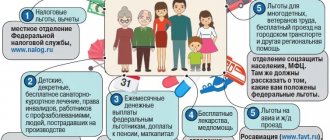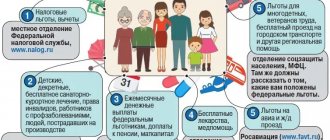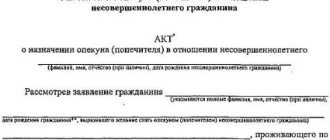Disabled people of groups 1 and 2 need help and support from able-bodied people. Therefore, the state provides leave to care for people with disabilities. A certain number of days are allocated to provide assistance to loved ones. The duration of such leave is regulated by current legislation. Therefore, relatives of people with disabilities should be aware of their rights in order to be able to pay more attention to relatives with serious illnesses and disorders in the functioning of the body. Especially in those periods when it is extremely necessary.
Who can receive disability benefits?
Carers and assistants can look after people with disabilities. Guardians are the legal representatives of citizens with disabilities. They act in the interests of the ward without a power of attorney. The basis for representing the interests of disabled, incapacitated or partially capable persons is the “Act of Appointment...”. The document is issued and certified by the guardianship authority. The appointment of guardianship over incapacitated adults occurs by court decision.
The rights and responsibilities of guardians are determined by Article 15 of the Federal Law of April 24, 2008 No. 480-FZ. Applicants must be of legal age and legal capacity.
Assistants can also care for disabled people (with the exception of group I childhood disabilities). For example, one of the relatives or third parties. The disabled person independently determines the amount of assistance. Assistants are entitled to payments for the entire period of caring for a disabled person (Decree of the President of the Russian Federation of December 26, 2006 No. 145). The benefit is paid even if the assistant lives separately from the ward.
An assistant can be any individual over 14 years of age. The person must be able to work, but not work and not receive a pension or unemployment benefits.
On a note! Incapacity refers to a person's inability to understand the meaning of their own actions and control their actions. Guardians provide care for incapacitated persons.
Benefit rate
When caring for a disabled child under 18 years of age, parents are paid 10,000 rubles. If a regional coefficient is in effect in the region, then the amount of assistance can increase to 20,000 (Letter of the Ministry of Labor of the Russian Federation dated 06/09/2003 No. 1199-16). Guardians of disabled adults receive an additional payment of 1,200 rubles.
Guardians are also entitled to the following benefits:
- Reimbursement of costs for housing and communal services – 50%.
- Once a year, vacation in a sanatorium with your ward.
- Discount on payment of land tax.
- Exemption from property tax (Article 407 of the Tax Code of the Russian Federation).
- Exemption from payment of transport tax (cars up to 200 hp).
Group I disabled people are also paid a disability pension. The incapacitated person's money is usually managed by a guardian.
Non-working able-bodied persons are paid 1200 rubles monthly. Residents of the Far North receive payments taking into account the regional coefficient (1.15-2). The money is accrued along with the pension of the disabled citizen.
Subjects of the Russian Federation may provide additional types of payments to families of disabled people. For example, clause 1.4 of the Moscow PP dated 12/16/2020 No. 2260-PP.
Can guardianship be denied?
Based on the results of the audit, guardianship may not be allowed if the candidate does not meet the established requirements:
- lack of funds to meet one's own living needs;
- medical contraindications;
- being registered with drug treatment authorities or a psychiatric institution;
- having a criminal record.
A person providing assistance to a disabled citizen should not have contraindications and selfish motives, since guardianship is gratuitous assistance, therefore he may be denied care if a desire is revealed to illegally claim the property of an elderly ward; as a result, such a person will not receive permission. Any transactions are permitted only with a general agreement with the disabled person and the consent of the guardianship staff.
Benefits for disabled people of group 1
Benefits for disabled people of the first group:
- Disability pension.
- Payments for disabled children.
- Monthly allowance for a disabled child of group 1.
- Monthly compensation payments for the loss of a breadwinner.
- Compensation payments in connection with increased food prices.
- Special conditions for studying at school.
- Special working conditions for guardians.
On a note! Disability pensions are not provided to children.
The list of additional benefits and social payments depends on the region of residence of the person (disabled person, guardian).
Benefits for disabled people of group 2
Benefits for disabled people of the second group:
- Disability pension.
- Monthly allowance for caring for a disabled person from childhood until the age of 23.
- Survivor benefits.
On a note! Some types of payments for children with disabilities of groups 1 and 2 are repeated.
Separate benefits are provided to single mothers, orphans and large families. More information can be found on the City Administration website.
Guardians of disabled children can apply for a shortened working day (Article 93 of the Labor Code of the Russian Federation).
Sending on business trips, engaging in work at night or on weekends is allowed only with the consent of the employee (Article 259 of the Labor Code of the Russian Federation).
In some cases, an employer does not have the right to terminate an employment contract with an employee who is raising a disabled child (Article 261 of the Labor Code of the Russian Federation).
The guardian is entitled to four paid days per month. The procedure for granting days off was approved by the Russian Federation GD dated October 13, 2014 No. 1048. Payment is made in the amount of average earnings.
Guardians of disabled children can choose the time of annual leave at their own discretion (Article 262.1 of the Labor Code of the Russian Federation). Plus, they are entitled to 14 unpaid days.
Filling out sick leave from the minimum wage by an employer in 2021 - sample
The legislator has established cases in which the minimum wage indicator is taken into account when calculating:
- in the billing period under consideration, the employee does not have an official salary;
- less than six months of experience;
- salary level is below the minimum wage;
- missing (for an unexcused reason) an appointment with a doctor.
The presence of any of the above reasons allows you to take it into account when calculating the minimum wage. The minimum wage form is filled out in the same way as a regular sick leave, with the exception of the average earnings column. All required information is entered in the “To be completed by employer” field.
The following information is entered:
- insurance experience;
- the period for which the benefit was accrued;
- average earnings for calculating benefits. The average earnings (according to the minimum wage) in 2021, calculated for 2 billing periods, will be 227,736 rubles, this value is recorded in the specified column;
- average daily earnings. Average daily earnings are calculated by dividing the total amount for two billing periods by 730 days, in this case it will be 311.96 rubles;
- the amount of benefits paid at the expense of the employer;
- amount from the Social Insurance Fund;
- total amount of charges.
Benefit for disabled children
How much do disabled children get paid? They are entitled to monthly cash payments in the amount of 2,919.02 rubles. The basis for receiving benefits is the Federal Law of November 24, 1995 No. 181-FZ and the Law of the Russian Federation of May 15, 1991 No. 1244-1.
Note. The amount of EDV is valid from February 1, 2021 (indexation coefficient 1.049%).
Separately, citizens are entitled to one-time payments when adopting children. For example, in Moscow they give 6,023 rubles for the first child, 15,879 for the second.
Disabled people from childhood, groups 1 and 2 are also entitled to a tax deduction. Its size is 12,000 rubles. for parents and 6,000 rub. for guardians (Article 218 of the Tax Code of the Russian Federation).
Registration of sick leave when caring for a disabled person
A sick leave certificate is issued for the entire period of treatment of the child. However, payment for it is made only for 120 days a year. This may include different treatments and illnesses. Sick leave payment scheme:
- Inpatient treatment – in the amount of average monthly earnings.
- Outpatient treatment - 100% for the first 10 days, 50% for all subsequent days.
When caring for an adult, a different procedure applies. For each disease, a sick leave certificate is issued for 7 days. The maximum period of sick leave during the year is 30 days.
Where to go
To register guardianship, you must contact the guardianship and trusteeship authorities at the applicant’s place of residence.
How to receive cash benefits for caring for a disabled child? To receive social benefits, you need to submit documents to the local Pension Fund. Citizens can also contact the MFC. More information about the procedure for applying for benefits here.
Who can apply for cash payments to care for disabled people? A package of documents to receive benefits must be submitted by a guardian.
Deadline for announcement of the decision
Registration of guardianship takes about 14 days. The guardianship authority is given 10 days to conduct a survey of housing conditions and three days to draw up a report. Usually during this time a conclusion is prepared on the possibility (impossibility) of being a guardian.
Package of documents for guardianship
List of documents for registration of guardianship:
- Application from the applicant.
- Brief autobiography.
- Consent of the ward to receive help from a third party.
- A certificate from the Pension Fund stating that the applicant is not receiving a pension.
- Evidence of non-payment of unemployment benefits.
- Medical report (form No. 164/у).
- Passport of the future guardian.
- Certificate of income from employment for 12 months.
- Consent of all family members to accept someone else's child.
- Marriage registration certificate.
The package of documents depends on who is receiving guardianship (child or adult). Immediately after registration of guardianship, you can apply to the Pension Fund for payment of benefits.
How to make payments
All payments are transferred by the Pension Fund. They can be used only after guardianship has been established through the OOiP. How everything looks step by step:
- The guardian enters into a guardianship agreement and collects documents for the Pension Fund.
- The documentation is submitted to the territorial division of the Pension Fund, where it is reviewed within 10-15 days.
- Based on the results of the review, the authorized person makes a decision on the assignment of payments. The applicant is notified of this in writing.
- Benefits begin to be transferred from the month following the date of application.
Important! If guardianship was established, but the citizen applied for payments only a few months later, it is impossible to receive them for the past period. The money is transferred to the guardian monthly to the bank account specified in the application for the Pension Fund.
Documentation
When contacting the Pension Fund, the following is provided:
| Document | Where to get | Validity |
| Applicant's passport | MARRIAGE REGISTRY | Changes when changing your full name, and also according to plan - at 20 and 45 years old |
| Application for assignment of payments | Pension Fund | Indefinitely, unless the date of provision is specified |
| OO&P act on the appointment of a guardian | Guardianship authority | Indefinitely or until the date specified in the OO&P act |
| SNILS | Pension Fund | Indefinitely |
| Certificate of lack of employment | Pension Fund | 1 month |
If necessary, Pension Fund employees may request additional documentation. It must be submitted within the agreed upon time frame.
Additional questions
No. 1. Can 2 or 3 people provide care at the same time?
A guardian or non-working citizen has the right to care for several persons at the same time. In this case, benefit payments are made for each person separately.
No. 2. Where should I go to apply for guardianship?
Interested persons should contact the guardianship authority at their place of residence. More information on how to properly arrange care for a disabled person here. If we are talking about an adult who is incompetent, then you first need to go to court. He must recognize the ward as incompetent or partially capable.
No. 3. Is the period of guardianship included in the length of service?
The insurance period of guardians increases for the period of caring for incapacitated or partially capable citizens (18 months of guardianship = 1 year of work).
Who can be a guardian?
A person who has expressed a desire to care for a disabled person must meet the requirements established by regulatory legal acts:
- absence of criminal record, alcohol and drug addiction;
- relevant health indicators confirmed by a medical certificate;
- providing information about work experience, education and income;
- the availability of suitable living quarters if the disabled person will live on the territory of the guardian;
- lack of permanent employment in another job.
A guardian who meets all these requirements is entitled to be issued a certificate giving him the right to care. A guardian can be a relative (son, brother, etc.), an acquaintance or an unfamiliar volunteer who independently contacts the protection department.
The commission determines the place of subsequent residence of the guardian and the patient - this can be the living space of either of them, by agreement, but it must be suitable for living and convenient for working with a disabled person.
Can a group 3 disabled person be a guardian?
Every citizen who wants to care for a sick person undergoes a mandatory commission. The guardian must be physiologically and mentally capable, not need someone else's help, and not physically experience difficulties in helping another person.
Circumstances that will lead to denial of guardianship include the presence of mental illness, as well as limitations in physical activity or the presence of serious diseases that pose a threat to his health with additional stress.










